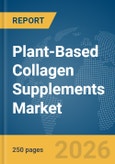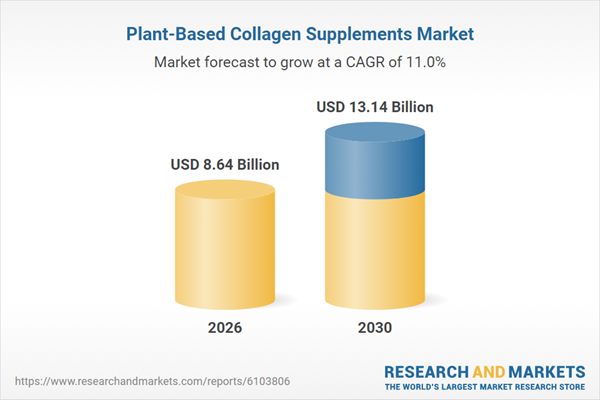The plant-based collagen supplements market size is expected to see rapid growth in the next few years. It will grow to $13.14 billion in 2030 at a compound annual growth rate (CAGR) of 11%. The growth in the forecast period can be attributed to increasing innovation in plant-based collagen boosters, rising demand for sustainable beauty nutrition, expansion of personalized plant-based supplements, growing investments in botanical research, increasing global adoption of vegan lifestyles. Major trends in the forecast period include increasing demand for vegan collagen alternatives, rising use of botanical amino acid blends, growing focus on clean-label supplement formulations, expansion of plant-based beauty and joint health products, enhanced emphasis on sustainable ingredient sourcing.
Growing awareness about the vegan diet is expected to drive the expansion of the plant-based collagen supplements market in the coming years. A vegan diet excludes all animal products, including meat, dairy, eggs, and honey, focusing solely on plant-based foods. This rising awareness is fueled by consumers’ desire for healthier lifestyles and sustainable nutrition options that address environmental and animal welfare concerns. Plant-based collagen supplements play a key role in vegan diets by providing essential nutrients and amino acids that support skin, joint, and bone health while avoiding animal-derived ingredients, aligning with ethical and sustainable choices. For example, according to Finder, an Australia-based fintech platform, in January 2025, about 6.4% of UK adults, roughly 3.4 million people, planned to follow a vegan diet, up from 2.1% in 2024. As a result, increasing awareness of vegan diets is boosting demand for plant-based collagen supplements.
Companies in the plant-based collagen supplements market are concentrating on creating innovative products such as pectin-based gummies to offer natural, vegan-friendly alternatives that support collagen production and meet the growing demand for sustainable, plant-derived wellness solutions. Pectin-based gummies use pectin - a natural carbohydrate from fruits - as a gelling agent instead of gelatin, making them suitable for vegans and vegetarians. For instance, in July 2024, Herbaland Naturals Inc., a Canada-based natural health and wellness brand, introduced Vegan Collagen Booster Gummies. This plant-based supplement is formulated to naturally enhance collagen production with ingredients like lysine, vitamin A, and amla fruit. The product addresses the rising demand for vegan-friendly, natural beauty and wellness options and provides a tasty, sugar-free, and organic choice.
In February 2024, Evonik Industries AG, a Germany-based specialty chemicals company, partnered with Jiangsu Jland Biotech Co. Ltd. to develop and market plant-based collagen solutions for the cosmetics sector. This collaboration aims to broaden their reach in the plant-based collagen market, foster innovation, and deliver more sustainable products for the cosmetics industry. Jiangsu Jland Biotech Co. Ltd., based in China, specializes in developing and producing plant-based collagen solutions for cosmetics and personal care products.
Major companies operating in the plant-based collagen supplements market are Bulletproof 360 Inc., Ming Chyi Biotechnology Ltd., Organifi LLC, Vital Proteins LLC, MaryRuth Organics, Ancient Nutrition LLC, PlantFusion, Neocell Corporation, Sunwarrior LLC, Great Lakes Gelatin Co., Feel Holdings Limited, FUTUREKIND INDIA PRIVATE LIMITED, Rae Wellness PBC, Codeage, Superior Supplement Manufacturing Inc., Rheal Superfoods Ltd., Ancient + Brave, VeCollal, Creative Enzymes LLC, Primal Kitchen Inc.
North America was the largest region in the plant-based collagen supplements market in 2025. Asia-Pacific is expected to be the fastest-growing region in the forecast period. The regions covered in the plant-based collagen supplements market report are Asia-Pacific, South East Asia, Western Europe, Eastern Europe, North America, South America, Middle East and Africa. The countries covered in the plant-based collagen supplements market report are Australia, Brazil, China, France, Germany, India, Indonesia, Japan, Taiwan, Russia, South Korea, UK, USA, Italy, Spain, Canada.
The plant-based collagen supplements market consists of sales of capsules, powders, gummies, and liquids made from vegan ingredients. Values in this market are ‘factory gate’ values, that is the value of goods sold by the manufacturers or creators of the goods, whether to other entities (including downstream manufacturers, wholesalers, distributors and retailers) or directly to end customers. The value of goods in this market includes related services sold by the creators of the goods.
The market value is defined as the revenues that enterprises gain from the sale of goods and/or services within the specified market and geography through sales, grants, or donations in terms of the currency (in USD unless otherwise specified).
The revenues for a specified geography are consumption values that are revenues generated by organizations in the specified geography within the market, irrespective of where they are produced. It does not include revenues from resales along the supply chain, either further along the supply chain or as part of other products.
This product will be delivered within 1-3 business days.
Table of Contents
Executive Summary
Plant-Based Collagen Supplements Market Global Report 2026 provides strategists, marketers and senior management with the critical information they need to assess the market.This report focuses plant-based collagen supplements market which is experiencing strong growth. The report gives a guide to the trends which will be shaping the market over the next ten years and beyond.
Reasons to Purchase::
- Gain a truly global perspective with the most comprehensive report available on this market covering 16 geographies.
- Assess the impact of key macro factors such as geopolitical conflicts, trade policies and tariffs, inflation and interest rate fluctuations, and evolving regulatory landscapes.
- Create regional and country strategies on the basis of local data and analysis.
- Identify growth segments for investment.
- Outperform competitors using forecast data and the drivers and trends shaping the market.
- Understand customers based on end user analysis.
- Benchmark performance against key competitors based on market share, innovation, and brand strength.
- Evaluate the total addressable market (TAM) and market attractiveness scoring to measure market potential.
- Suitable for supporting your internal and external presentations with reliable high-quality data and analysis
- Report will be updated with the latest data and delivered to you along with an Excel data sheet for easy data extraction and analysis.
- All data from the report will also be delivered in an excel dashboard format.
Description
Where is the largest and fastest growing market for plant-based collagen supplements? How does the market relate to the overall economy, demography and other similar markets? What forces will shape the market going forward, including technological disruption, regulatory shifts, and changing consumer preferences? The plant-based collagen supplements market global report answers all these questions and many more.The report covers market characteristics, size and growth, segmentation, regional and country breakdowns, total addressable market (TAM), market attractiveness score (MAS), competitive landscape, market shares, company scoring matrix, trends and strategies for this market. It traces the market’s historic and forecast market growth by geography.
- The market characteristics section of the report defines and explains the market. This section also examines key products and services offered in the market, evaluates brand-level differentiation, compares product features, and highlights major innovation and product development trends.
- The supply chain analysis section provides an overview of the entire value chain, including key raw materials, resources, and supplier analysis. It also provides a list competitor at each level of the supply chain.
- The updated trends and strategies section analyses the shape of the market as it evolves and highlights emerging technology trends such as digital transformation, automation, sustainability initiatives, and AI-driven innovation. It suggests how companies can leverage these advancements to strengthen their market position and achieve competitive differentiation.
- The regulatory and investment landscape section provides an overview of the key regulatory frameworks, regularity bodies, associations, and government policies influencing the market. It also examines major investment flows, incentives, and funding trends shaping industry growth and innovation.
- The market size section gives the market size ($b) covering both the historic growth of the market, and forecasting its development.
- The forecasts are made after considering the major factors currently impacting the market. These include the technological advancements such as AI and automation, Russia-Ukraine war, trade tariffs (government-imposed import/export duties), elevated inflation and interest rates.
- The total addressable market (TAM) analysis section defines and estimates the market potential compares it with the current market size, and provides strategic insights and growth opportunities based on this evaluation.
- The market attractiveness scoring section evaluates the market based on a quantitative scoring framework that considers growth potential, competitive dynamics, strategic fit, and risk profile. It also provides interpretive insights and strategic implications for decision-makers.
- Market segmentations break down the market into sub markets.
- The regional and country breakdowns section gives an analysis of the market in each geography and the size of the market by geography and compares their historic and forecast growth.
- Expanded geographical coverage includes Taiwan and Southeast Asia, reflecting recent supply chain realignments and manufacturing shifts in the region. This section analyzes how these markets are becoming increasingly important hubs in the global value chain.
- The competitive landscape chapter gives a description of the competitive nature of the market, market shares, and a description of the leading companies. Key financial deals which have shaped the market in recent years are identified.
- The company scoring matrix section evaluates and ranks leading companies based on a multi-parameter framework that includes market share or revenues, product innovation, and brand recognition.
Report Scope
Markets Covered:
1) By Product Type: Gelatin; Hydrolyzed Collagen; Native Collagen2) By Source: Hemp; Soy; Pea Protein; Others Source
3) By Form: Powdered; Non-Powdered
4) By Application: Food and Beverages; Pharmaceutical and Healthcare; Others Applications
5) By Distribution Channel: Offline; Online
Subsegments:
1) By Gelatin: Food Grade Gelatin; Pharmaceutical Grade Gelatin; Cosmetic Grade Gelatin; Industrial Grade Gelatin2) By Hydrolyzed Collagen: Powder Form; Liquid Form; Capsule Form; Functional Food and Beverage Additives
3) By Native Collagen: Type I Collagen; Type II Collagen; Type III Collagen; Skincare and Dermatology Applications
Companies Mentioned: Bulletproof 360 Inc.; Ming Chyi Biotechnology Ltd.; Organifi LLC; Vital Proteins LLC; MaryRuth Organics; Ancient Nutrition LLC; PlantFusion; Neocell Corporation; Sunwarrior LLC; Great Lakes Gelatin Co.; Feel Holdings Limited; FUTUREKIND INDIA PRIVATE LIMITED; Rae Wellness PBC; Codeage; Superior Supplement Manufacturing Inc.; Rheal Superfoods Ltd.; Ancient + Brave; VeCollal; Creative Enzymes LLC; Primal Kitchen Inc.
Countries: Australia; Brazil; China; France; Germany; India; Indonesia; Japan; Taiwan; Russia; South Korea; UK; USA; Italy; Spain; Canada
Regions: Asia-Pacific; South East Asia; Western Europe; Eastern Europe; North America; South America; Middle East; Africa
Time Series: Five years historic and ten years forecast.
Data: Ratios of market size and growth to related markets, GDP proportions, expenditure per capita.
Data Segmentation: Country and regional historic and forecast data, market share of competitors, market segments.
Sourcing and Referencing: Data and analysis throughout the report is sourced using end notes.
Delivery Format: Word, PDF or Interactive Report + Excel Dashboard
Added Benefits:
- Bi-Annual Data Update
- Customisation
- Expert Consultant Support
Companies Mentioned
The companies featured in this Plant-Based Collagen Supplements market report include:- Bulletproof 360 Inc.
- Ming Chyi Biotechnology Ltd.
- Organifi LLC
- Vital Proteins LLC
- MaryRuth Organics
- Ancient Nutrition LLC
- PlantFusion
- Neocell Corporation
- Sunwarrior LLC
- Great Lakes Gelatin Co.
- Feel Holdings Limited
- FUTUREKIND INDIA PRIVATE LIMITED
- Rae Wellness PBC
- Codeage
- Superior Supplement Manufacturing Inc.
- Rheal Superfoods Ltd.
- Ancient + Brave
- VeCollal
- Creative Enzymes LLC
- Primal Kitchen Inc.
Table Information
| Report Attribute | Details |
|---|---|
| No. of Pages | 250 |
| Published | January 2026 |
| Forecast Period | 2026 - 2030 |
| Estimated Market Value ( USD | $ 8.64 Billion |
| Forecasted Market Value ( USD | $ 13.14 Billion |
| Compound Annual Growth Rate | 11.0% |
| Regions Covered | Global |
| No. of Companies Mentioned | 21 |









